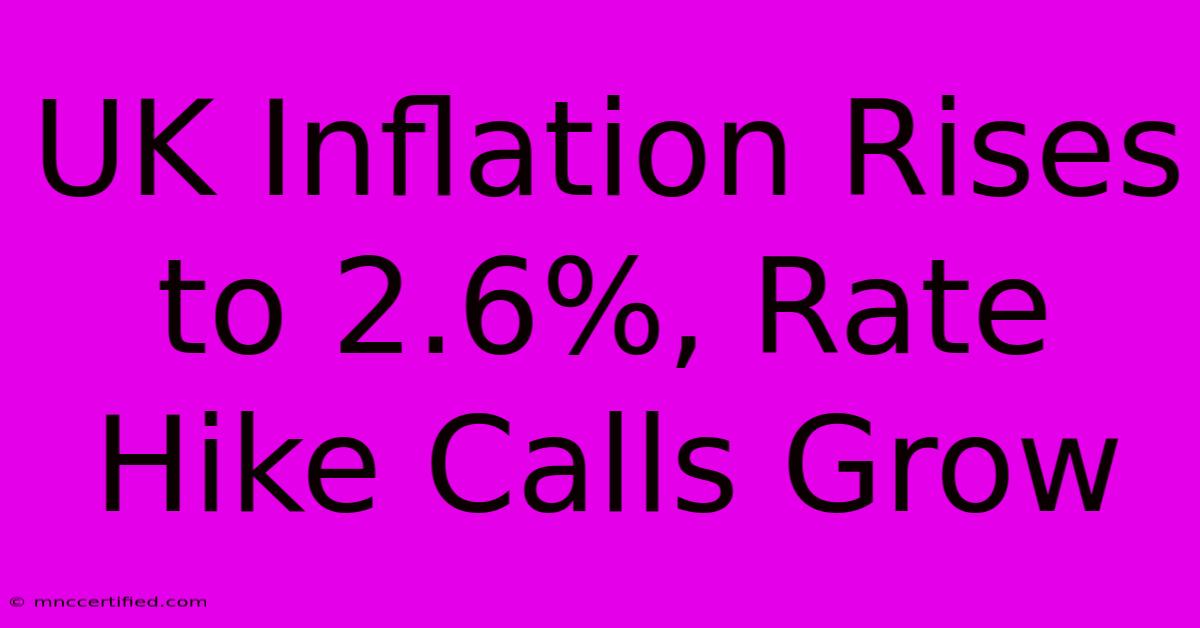UK Inflation Rises To 2.6%, Rate Hike Calls Grow

Table of Contents
UK Inflation Rises to 2.6%, Rate Hike Calls Grow
The UK's inflation rate climbed to 2.6% in July, exceeding expectations and fueling speculation of an imminent interest rate hike by the Bank of England. This increase marks a significant jump from the previous month and further complicates the economic outlook for the nation. The surge has sparked intense debate among economists and policymakers, with calls for a rate increase growing louder. This article delves into the factors driving this inflation surge, its potential impact on the UK economy, and the likely response from the Bank of England.
Understanding the Inflation Surge
The 2.6% inflation figure, released by the Office for National Statistics (ONS), surpassed analysts' predictions and represents a considerable increase compared to the previous month's rate. Several factors contributed to this jump:
-
Energy Prices: A significant driver was the rising cost of energy, particularly gas and electricity. Global energy markets remain volatile, impacting household bills and contributing significantly to the overall inflation rate. This is a key concern for many UK households struggling with the cost of living.
-
Supply Chain Disruptions: Ongoing supply chain bottlenecks continue to exert upward pressure on prices. The global shortage of goods, exacerbated by Brexit and the pandemic's lingering effects, makes it harder for businesses to source materials and keep prices low. This is a persistent problem affecting numerous sectors.
-
Demand-Pull Inflation: Robust consumer spending, fuelled by pent-up demand following lockdowns, has also contributed to inflation. As the economy recovers, increased demand for goods and services pushes prices higher. This highlights the delicate balance the Bank of England must strike between supporting economic growth and controlling inflation.
-
Brexit Impacts: The ongoing effects of Brexit continue to be debated as a contributing factor. Changes in trade relationships and increased import costs are argued by some to have added to inflationary pressures. This is a complex and politically charged aspect of the situation.
The Implications for the UK Economy
This rise in inflation presents several challenges to the UK economy:
-
Cost of Living Crisis: The increased cost of essential goods and services is placing a strain on household budgets, potentially leading to a reduction in consumer spending and impacting economic growth. This is a major social and political concern.
-
Erosion of Purchasing Power: Higher inflation erodes the purchasing power of consumers, meaning their money buys less than before. This can lead to decreased consumer confidence and potentially slower economic growth.
-
Uncertainty for Businesses: Businesses face higher input costs, forcing them to either absorb the increased expenses or pass them on to consumers, potentially further fueling inflation. This creates uncertainty in business investment and planning.
-
Pressure on the Bank of England: The Bank of England is under immense pressure to manage inflation without triggering a sharp economic slowdown. Finding the right balance is crucial.
The Bank of England's Response: Rate Hike Speculation
The surge in inflation significantly increases the likelihood of the Bank of England raising interest rates. A rate hike aims to cool down the economy by making borrowing more expensive, thereby reducing consumer spending and inflationary pressure. However, a rate hike also carries risks:
-
Economic Slowdown: Raising interest rates too aggressively could trigger a sharp economic slowdown or even a recession. The Bank must carefully calibrate its response.
-
Mortgage Payments: Higher interest rates directly impact mortgage payments, potentially causing financial hardship for homeowners. This is a significant political consideration.
-
Balancing Act: The Bank of England faces a delicate balancing act – controlling inflation without stifling economic recovery. This requires a nuanced and data-driven approach.
Conclusion: Navigating Uncertain Waters
The rise in UK inflation to 2.6% presents a significant challenge for policymakers. The Bank of England is likely to respond with an interest rate hike, but the timing and magnitude of such a move will be crucial in navigating the complex economic landscape. The interplay between energy prices, supply chain issues, and consumer demand will continue to shape the inflationary outlook in the coming months. The situation requires careful monitoring and strategic policy decisions to mitigate the negative impacts on the UK economy and its citizens. The coming months will be pivotal in determining the effectiveness of any measures implemented.

Thank you for visiting our website wich cover about UK Inflation Rises To 2.6%, Rate Hike Calls Grow. We hope the information provided has been useful to you. Feel free to contact us if you have any questions or need further assistance. See you next time and dont miss to bookmark.
Featured Posts
-
Rlusd Stablecoin Ripples Official Launch
Dec 18, 2024
-
Rayful Edmond Dc Drug Kingpin Dies At 60
Dec 18, 2024
-
Conor Mc Gregor Confirms India Fight
Dec 18, 2024
-
Santa Ana Winds Jurupa Valley Brush Fire
Dec 18, 2024
-
Pakistan Wins Ayub And Aghas Heroics
Dec 18, 2024